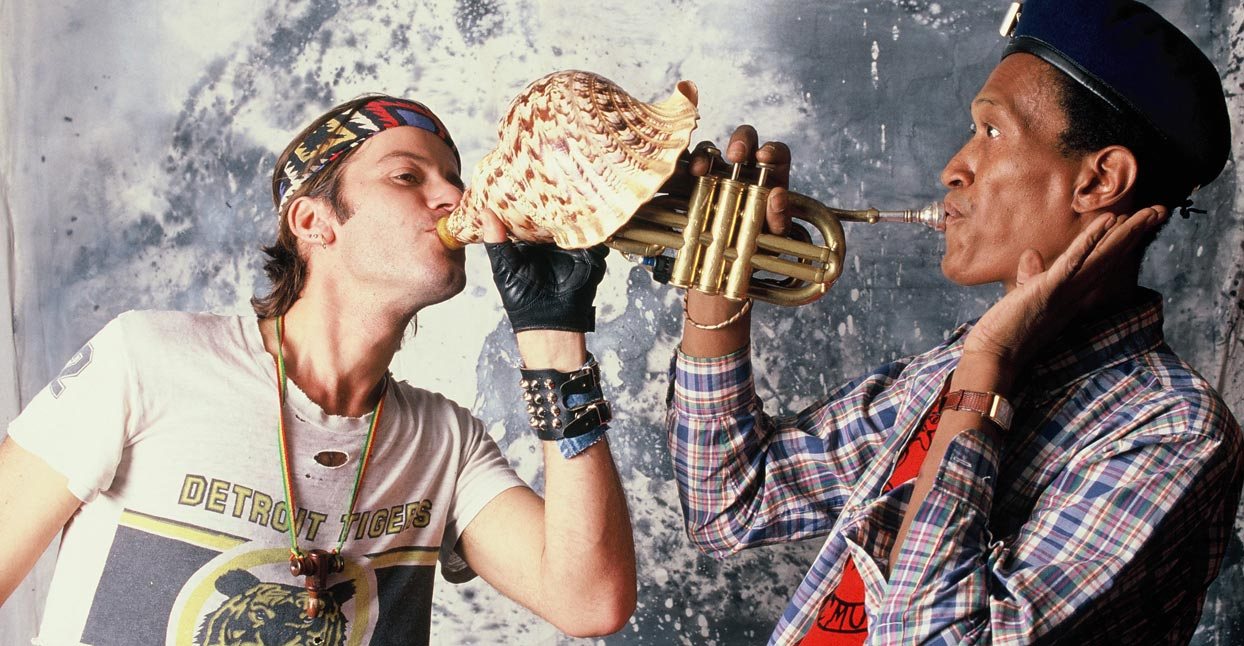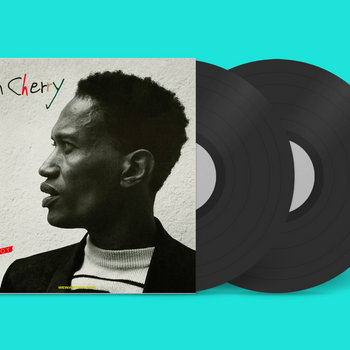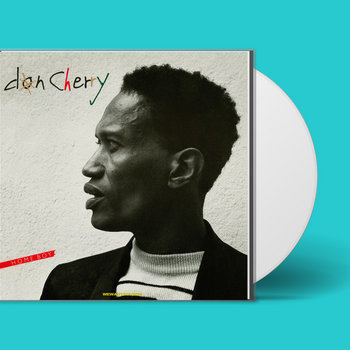 Photo by Polo Lombardo
Photo by Polo Lombardo
In Paris, Don Cherry found a cultural Shangri-La. The trumpeter might have been registered to vote in Long Island, but he spent a significant chunk of the 1980s rubbing shoulders with musicians, poets, beatniks, and bohemians in the small-time hangouts of la Ville Lumière. Like geniuses James Baldwin and Nina Simone before him, Cherry found artistic octane in the French soil. One of the results: 1985’s Home Boy (Sister Out), a lost record from an oft undervalued time in the musician’s life that nonetheless offers a vital document for anyone trying to fully map Cherry’s pluralistic, technicolor world.




2 x Vinyl LP, Compact Disc (CD)


Recorded in Paris over five days, Home Boy (Sister Out) is unrecognizable from the records Cherry helped cut as one of Ornette Coleman’s most trusted lieutenants. It’s an exercise in uptempo jazz and downtown Paris funk; the marriage of no wave to the avant-garde. Even wacky old-school hip-hop and righteous reggae find their way into the mix, with everything presented in that clean, rubbery form of production that defined 1980s pop records. The joy, audacity, and musicianship in Cherry’s musical id here is undeniable.
Paris is a hell of a long way from Watts, the L.A. neighborhood where Cherry received his music education. Born in Oklahoma City in 1936, young Don was exposed to music from his trumpet-playing father, but it was the move to Cali at an early age that intensified his passion. During the mid ‘50s, Cherry orbited the same circles as revered artists like tenor man George Newman, bassist Charlie Haden, and drummer Lenny McBrowne. By 1957, he’d linked up with the incomparable Ornette Coleman. Their legacies would become unbreakably tied to one another. With the trumpet player by his side, Coleman is credited as blazing an extended, continuous, structure-free improvisation style of music called free jazz. His band scorched the musical turf behind them without ever turning their heads. This thirst for new styles never left Cherry’s being.
Even among a platoon of jazz legends, Cherry stood out. His weapon of choice was the pocket trumpet (or cornet), a scaled-down version of the full-sized model that produced a slightly more nasal sound than is typical of the larger horn. “His instrument was unique,” says Jai Uttal, the world music star who recruited Cherry for his debut album, Footprints, back in 1990. “The pocket trumpet was just different. it had a different sound, a different flavor. That immediately set him apart.”
Into the 1970s, Cherry lived in Sweden for four years. He was a musical pilgrim, traveling around Europe, the Middle East, Northern India, Brazil, Nigeria, and Turkey, becoming increasingly interested in non-Western styles of music. “Don was completely a world musician,” says Uttal. “His whole expression musically became this melting pot of all different kinds of music—African music, different types of Indian music, Middle Eastern music, and just basically what you could [call] ‘Don music.’”


2 x Vinyl LP, Compact Disc (CD)


Paris, though, was a city Cherry had a long relationship with and never seemed far from his thoughts. As fate would have it, his wanderings would unite him with an artistic spirit who would snap completely in line with his own.
Ramuntcho Matta was just a 17-year-old kid with a melodica in hand the first time he saw Don Cherry strolling the streets of Paris. That the jazzman was carrying the same instrument seems an impossible coincidence. Yet there he was, and as a Cherry fan, Matta was astonished to see his hero wave at him. Striking up a conversation on the street, the pair agreed to meet at Cherry’s hotel on Boulevard Raspail that night and jam, sowing the seeds of a great friendship and collaborative partnership. “We became old brothers really,” Matta tells me, four decades later.
Matta became heavily embedded in the Parisian arts scene. The son of the Chilean painter Roberto Matta, and the brother of artists Gordon Matta-Clark, Federica Matta, and Pablo Echaurren, he formed an career in music in the late ‘70s using sound, artwork, video, and words to give form to a complex set of creative topics. He also had strong ties to downtown Manhattan’s glorious Soho loft era, and once shared an apartment with Arto Lindsay and Nana Vasconcelo. (His brother Gordon, a native New Yorker, tragically committed suicide in 1978.) Matta would go on to count innovators like John Cage, Meredith Monk, and Chris Marker as collaborators. In Paris, he was surrounded by musicians, poets, and other creatives. Cherry’s friendship with Matta allowed him access to the city’s deepest catacombs.
Meanwhile, Cherry’s musical proclivities saw him develop a taste for performing more tightly written songs than the lengthy freestyle jazz wig-outs he’d made his name on. This was clearly evidenced backstage at a Miles Davis concert in Paris, when Cherry threw down a Billie Holliday songbook and the two legends spun genius from it. In the aftermath, Matta quizzed Cherry on whether he’d be interested in recording his own song-led LP. The artist was skeptical on whether or not it would be supported.
“In the record industry in the States,” Cherry told Matta, “it’s very hard, because when you start being somebody, you have to keep being that somebody. They won’t accept the change.”
“I don’t believe you,” replied Matta. “You’re Don Cherry, you can play whatever you want.”
“Yeah, try,” Cherry responded. The challenge was accepted.
It would take a doggedly determined Matta four years to get the project off the ground. First, he took the idea to Atlantic Records founder Ahmet Ertegun, who swiftly dismissed it for exactly the reasons Cherry had predicted. Nobody, Ertegun figured, wanted a more song-based, pop-leaning record from the trumpeter.


2 x Vinyl LP, Compact Disc (CD)


Cherry continued to live in NYC through the period. As Matta hustled, he would occasionally visit Cherry in his Long Island home—a building shared with Tina Weymouth and Chris Frantz from Talking Heads, as well as Brian Eno. Then when Cherry was in Paris, Matta would assemble the group of musicians that he’d like to play with. In the basement of Matta’s tiny house in Paris, genius would crystallize until the wee small hours.
“The art scene was really open for painting, movies, music, writing,” says Matta. “It was exciting to be in Paris, because it was a place where every night, something exciting was happening. And, also, there was a very cool attitude by the police about drugs and arts. Basically, if you’re an artist, you can take any drug and they will let you do whatever you want to do, because you’re not a criminal—just doing art. That was also something very important for that generation.”
Finally, an album deal was struck. Matta approached Barclay Records in Paris, run by A&R man Philippe Constantin. In 1984, Barclay was relaunching with a new sound, and Cherry fit the bill. Sessions were held at Studio Caroline, in the northeast district of Paris, the heart of sono mondiale—a term popularized by Radio Nova, the local radio station that helped push this pluralistic, culturally diverse musical revolution.
“The guy who owned the studio was just a cool guy,” remembers Matta. “I don’t know where he got the money together for that studio, but basically he didn’t need money, so we could have that studio for five days for the price of one day.”


2 x Vinyl LP, Compact Disc (CD)


As producer, Matta took the reins. Manu Dibango collaborator Jean-Pierre Coco and Uruguayan musician Negrito Trasante were recruited to play percussion. “I knew that these two musicians had the flexibility to adapt themselves,” says Matta, who also played guitar on the album. Bass player Jannick Top was among those who also joined the squad. “He’s a chameleon,” adds Matta. “I mean he can go in any style without rehearsing. He can really feel what you have in your head and play it.”
Matta’s work had paid off. Everything was in place, but there was another barrier to overcome: Cherry was struggling with heroin at the time and could not be relied upon to keep any kind schedule. Matta had to organize the five days so the musicians would be ready whenever Cherry was capable of showing up, day or night. To make sure he had Cherry in the studio as much as possible, the producer even had one of his friends at beck and call, ready to pick him up on a Vespa at a moment’s notice. “Basically, he was ready to play for one hour or one hour and a half and then [he was] disappearing again into drugs or street life or whatever,” explains Matta.
Despite the heroin use, Matta doesn’t describe Cherry’s life as being totally off the rails: “For him, taking drugs, it was almost a spiritual motivation, and he knew to find this energy to be inside the sound, he thought he needed drugs to get there.”
Cherry’s time in the studio might have been limited, but it didn’t matter as much when one or two takes were all he and the band required. The entire recording of Home Boy (Sister Out) was live, and required no overdubs. The result is a set of songs that shuffles through genres like a deck of cards. Take “Art Deco,” which features some of Cherry’s trademark freewheeling trumpet play before making way for some romantic accordion, as archetypically French as the Champs-Élysées. Punctuating the electric nature of Home Boy (Sister Out), the next song is “Rappin’ Recipe” where, in a scat-style vocal, Cherry improvises a recipe for sweet potato salad. He was hardly spitting fire like LL Cool J, but the fun little ditty underlines his desire to test himself across as many different musical styles as possible.
Elsewhere, Uruguayan post-punker Elli Medeiros sings background vocals on “Treat Your Lady Right” and “Bamako Love,” while painter and poet Brion Gysin—a friend of both Cherry and Matta—joins them on the track “Kick,” a creeping vision of urban addiction that was left off the LP, but released as a single. Cherry was also able to indulge in his appreciation for Jamaican music in the snaking, sultry jam “Reggae To The High Tower.”
“For him, reggae was really the essence of new poetry,” explains Matta. “For him, the message to change society should come from dancing. He was admiring a lot Bob Marley and Michael Smith, avant-garde poets that were expressing their art with reggae. For him, reggae was really the idea of unifying the planet with one dance.”


2 x Vinyl LP, Compact Disc (CD)


Matta assembled a nine-track album from the sessions but found it a difficult piece to sell. As had been predicted, long-time Cherry fans didn’t know what to make of the oddball grooves. And the musician himself didn’t make promoting the album easy for Matta. With his drug use spiraling, Cherry frequently flaked on tour dates and media appearances. According to Matta, Cherry even took to offering the rights to some of his songs in exchange for drugs.
“The drug situation became very, very difficult for him,” he says. “He went very sad but every time we were together it was great moments. But we knew it was not possible anymore to go on tour, or to do a record because I found him in a very bad state.”
Matta adds, “We tried a lot to help Don but the drug situation went more powerful than the taste of life.”
Matta was forced to abandon plans for an international rollout. Home Boy (Sister Out) only received a release in France and Germany, solidifying its position as a historic rarity in Cherry’s immense catalog.
Cherry continued to be active in music, recording a handful of solo albums and collaborative efforts. He reunited with Coleman on the well-received 1987 double-album In All Languages, the righteous closing of his career circle. Cherry died from liver cancer in 1995, leaving behind not just an unimpeachable body of work but a musical dynasty. His sons David Ornette Cherry, Christian Cherry, and Eagle-Eye Cherry, and stepdaughters Neneh Cherry and Titiyo all blazed their own trails in music. Neneh’s daughter Mabel is at the start of her own career. The lights in the great House of Cherry may never extinguish.
Belatedly, Home Boy (Sister Out) will receive a worldwide release via Wewantsounds. Included in the reissue are five bonus tracks, including “Kick.” For Matta, it marks the true completion of a lengthy project, one that was worth doing to definitively materialize the meaning of Cherry’s late era.
“For Don, this record is really jazz—the essence of what jazz could be today,” says Matta. “Really, it’s music without frontiers and without categories. The records he did after [Home Boy (Sister Out)], he did two or three records after, he got a producer from the record industry and they tried to make a product. And when you do this kind of music with these kinds of people, you just have to enjoy the moment—you pass together and after maybe it can become a product. So that’s why those records don’t have this flavor of fragility and intensity that I found in this record.”









